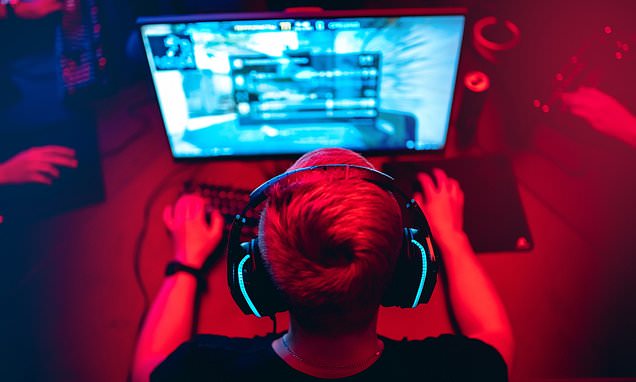Beyond the Headlines: Humanizing the Narrative
By: Javid Amin
Nestled amidst the serene beauty of Kashmir, often hailed as “Paradise on Earth,” a new challenge is quietly unfurling—online gaming addiction. In a region with a history of grappling with socio-political unrest, the surge in gaming addiction, particularly among the youth, adds a unique layer to the complexities faced by Kashmir. This comprehensive exploration aims not only to dissect the issue but also to ignite a constructive dialogue around the growing concerns and potential solutions.
The Changing Landscape of Kashmir:
Kashmir, a land of breathtaking natural beauty and cultural richness, is witnessing a shift in its social landscape. The ubiquitous presence of smartphones and affordable internet plans has facilitated the rapid rise of online gaming. Free-to-play games with in-app purchases have become a predominant form of entertainment and social interaction, especially among the youth. While the allure of these games is undeniable, the darker side of potential addiction and its repercussions cannot be dismissed.
Decoding the Allure: Unraveling Why Online Gaming Holds Sway:
Several factors contribute to the rise of online gaming in Kashmir:
- Accessibility: The increasing prevalence of smartphones and affordable internet plans has democratised access to online games, particularly among the youth.
- Social Connection: In a society where some individuals face social isolation, online games provide a virtual space for connection, fostering a sense of belonging.
- Escape from Reality: Online games serve as a temporary escape from the challenges that Kashmir has faced, providing a virtual realm where players can experience a sense of accomplishment and control.
- Competitive Thrill: The competitive nature of these games, coupled with the prospect of rewards and recognition, acts as a potent stimulant, furthering the desire to play.
The Dark Side of Addiction: Beyond Entertainment to Real Consequences:
While online gaming is undoubtedly a source of leisure, its unchecked consumption can transform it into an addiction, leading to severe negative consequences. Some alarming signs of excessive online gaming include:
- Neglecting Responsibilities: Prioritizing gaming over essential tasks such as education, work, or familial responsibilities.
- Financial Strain: Spending exorbitant amounts on in-app purchases, sometimes to the detriment of financial responsibilities.
- Health Implications: Disrupted sleep patterns, neglect of personal hygiene, and physical health problems due to extended screen time and sedentary habits.
- Social Withdrawal: A diminishing interest in real-world interactions, strained social connections, and feelings of loneliness and isolation.
- Mental Health Impact: Increased stress, anxiety, and even depression resulting from withdrawal symptoms during periods without access to online games.
A Collective Effort to Address the Challenge:
Effectively addressing the issue of online gaming addiction necessitates a collaborative approach involving various stakeholders.
Individual Level:
- Self-awareness and self-regulation: Encouraging individuals to be mindful of their gaming habits and develop strategies to manage screen time effectively.
- Exploring alternative healthy interests: Promoting engagement in sports, outdoor activities, and hobbies that facilitate real-world interaction and personal growth.
- Seeking professional help: Advocating for seeking assistance from counselors or therapists specializing in addiction treatment if struggling to control gaming habits.
Family Level:
- Open communication: Establishing transparent and honest communication between parents and children regarding gaming habits.
- Setting boundaries and monitoring activities: Implementing clear rules and limitations on screen time and gaming expenditure.
- Building positive alternatives: Encouraging families to participate in shared activities, fostering stronger connections and providing alternative avenues of enjoyment.
Community Level:
- Raising awareness: Initiating educational campaigns and awareness programs to help communities understand the risks of online gaming addiction and encourage responsible gaming practices.
- Promoting alternative activities: Providing affordable access to healthy alternatives such as sports facilities, cultural events, and educational programs to offer engaging substitutes to online gaming.
- Collaboration and support: Facilitating collaboration between community leaders, social workers, and mental health professionals for a coordinated effort to address the issue effectively.
Government Level:
- Regulatory measures: Implementing regulations on online gaming companies, including age verification for in-app purchases and setting spending limitations within games.
- Promoting responsible gaming practices: Encouraging gaming companies to adopt responsible gaming practices, such as prompts for time limits, age verification, and providing support resources for players facing difficulties.
- Investing in mental health services: Increasing access to affordable and quality mental health services can address underlying issues associated with online gaming addiction.
A Mother’s Story:
Aisha (name changed), a resident of Srinagar, narrates her struggle with her son’s online gaming addiction. “He used to be so active, playing cricket with his friends, but now he’s glued to his phone all day,” she confides. “He neglects his studies, avoids chores, and barely sleeps. We’ve tried talking to him, restricting his screen time, but it’s a constant battle.”
Aisha’s narrative mirrors the experiences of many families in Kashmir grappling with the consequences of online gaming addiction. The emotional and financial strain it places on families underscores the need for collective efforts to provide support and resources.
Finding Hope: Stories of Transformation:
However challenging, stories of hope and transformation emerge. Bilal (name changed), a young man from Shopian, shares his journey from addiction to recovery. “I lost track of everything, neglecting my studies and falling behind in college,” he admits. “But then, I realized how this was affecting my life and my family. I sought help from a therapist, joined a support group, and slowly began to regain control.”
Bilal’s journey stands as an inspiration, illustrating the potential for overcoming addiction with the right support and resources.
Bottom-line: A Call to Action: The issue of online gaming addiction in Kashmir is multifaceted, demanding a collective effort from individuals, families, communities, and the government. By fostering open communication, promoting healthy alternatives, and providing readily available support systems, we can navigate this challenge together, preserving the well-being of the youth and the unique cultural fabric of Kashmir.






